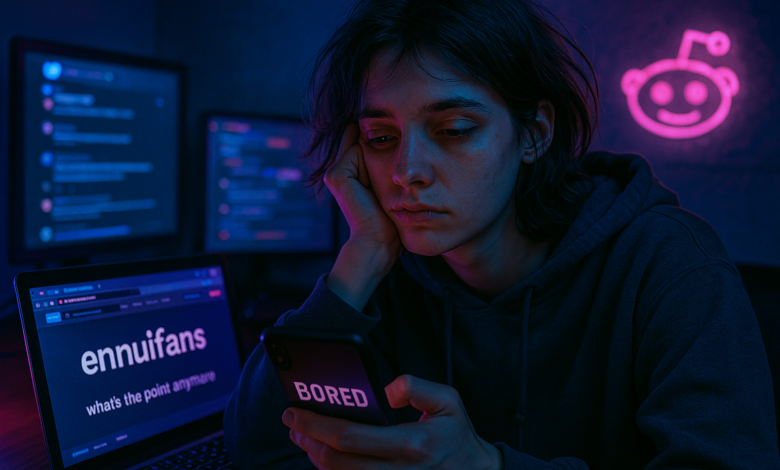Ennuifans: The Internet’s Coolest Club for People Who Are Bored, But Make It Aesthetic

There’s a weird little corner of the internet that’s been growing lately — it’s moody, it’s ironic, it’s oddly stylish. They call themselves ennuifans, and if you haven’t heard of them yet, don’t worry — you’re about to start seeing them everywhere.
At first glance, you might think ennuifans are just another group of overly online people posting sad quotes and grainy selfies. But look closer, and there’s something deeper (and a little more brilliant) going on. These aren’t just bored internet users — they’re turning boredom into an entire vibe. And honestly? It’s kind of genius.
Let’s break it all down.
What Are Ennuifans, Anyway?
The name itself is a mix of two ideas: “ennui” — a French word that means a sort of philosophical, soul-level boredom — and, well, fans. So put them together and you’ve got: people who are fans of ennui. Yep. Fans of being bored.
But it’s not that simple. Ennuifans aren’t just bored — they’re leaning in to the feeling. They romanticize the emptiness. They make jokes about it. They post about it in a way that somehow turns “I’m emotionally exhausted” into a curated aesthetic.
They’re not lazy — they’re existential. And that little difference changes everything.
This group is more than just a trend — it’s kind of a modern-day identity. Like digital philosophers with a meme folder, ennuifans explore what it means to feel disconnected in a world that’s always connected.
The Vibe: Moody, Minimal, and Totally Self-Aware
The visual identity of ennuifans is just as interesting as the mindset. Think washed-out colors, grainy filters, photos of empty streets or rain-soaked windows. A sad playlist is probably playing in the background. Maybe a Sylvia Plath quote in the caption, or a still from a French film no one’s really watched.
But here’s the thing: it’s all done with a wink. Ennuifans aren’t taking themselves too seriously. They know how dramatic it all looks — and that’s part of the charm.
This aesthetic isn’t about being fake-deep. It’s about capturing a feeling: being overwhelmed by everything, and yet feeling nothing. It’s quiet rebellion. It’s saying “I’m tired” — not just physically, but existentially. And somehow, it looks cool while doing it.
And yes, they know that’s ironic. That’s kind of the point.
Why People Are Embracing the Ennui
So, what’s drawing people into this oddly specific vibe? Why are more and more people identifying as ennuifans?
Simple: the world’s exhausting.
We’re constantly flooded with information, expectations, content, opinions, productivity hacks, and self-improvement mantras. It’s non-stop. And eventually, your brain hits a point where it just… shuts down. That’s where ennuifans come in.
Instead of pretending everything’s great or trying to “fix” themselves, ennuifans just accept the feeling. They sit in the stillness. They don’t run from boredom — they wear it like a badge.
It’s also a coping mechanism. For a lot of people, especially younger generations, expressing mental fatigue through humor and aesthetic is way easier than laying it all out emotionally. Ennuifans give people a way to say, “Yeah, I’m not okay — but at least I look mysterious while I figure it out.”
Humor Makes It All Work
This whole thing would be unbearably depressing if it weren’t for one key ingredient: humor.
Ennuifans are funny. Like, darkly, sarcastically, painfully funny. They’re masters of turning existential dread into meme gold. You’ll see posts like:
“Me: feels nothing. Also me: curates an entire Pinterest board about it.”
Or:
“Nietzsche said God is dead and I felt that in my soul while waiting for my Uber Eats.”
That mix of philosophy, pop culture, and absurdity? Classic ennuifans. It’s what sets them apart from just being another sad Tumblr revival. They’re not wallowing — they’re observing the chaos of life and laughing at it with a glass of iced coffee and 2% battery left.
The humor keeps it real. It’s not about glorifying depression — it’s about creating space to acknowledge it without being crushed by it.
What Being an Ennuifan Says About Online Culture
We’re living in the age of the personal brand. Everyone’s curating, posting, optimizing — even their identities. And in the middle of that, ennuifans show up like, “Actually? I don’t want to be a brand. I just want to feel things. Or maybe not feel anything at all. And I’d like to do that in peace, thank you.”
This is part of a bigger shift. Younger internet users aren’t always looking to stand out — they’re looking to belong. And ennuifans create a place where people can bond over being burnt out, unsure, and over it.
They’re not influencers. They’re anti-influencers. But somehow, that makes them even more influential.
Is This Just a Phase — Or Something Deeper?
You might be wondering if ennuifans are just part of a passing internet trend. A vibe that’ll vanish like cottagecore or clowncore (yep, that was a thing).
But here’s the thing: even if the name fades, the feeling is here to stay.
Because people aren’t just pretending to be tired — they are tired. The modern world is loud, fast, and emotionally draining. And movements like this one give people a way to push back against the pressure to always be productive, upbeat, and perfect.
In a world that constantly asks us to do more, ennuifans quietly say, “I’m just going to sit this one out.” And in that refusal, there’s a weird kind of freedom.
Why Ennuifans Actually Matter
It’s easy to look at ennuifans and think they’re just being dramatic. But scratch the surface, and you’ll see something much more interesting: a community that’s making space for stillness, for honesty, and for the weird in-between emotions we don’t always talk about.
They’re not preaching solutions. They’re not here to inspire. They’re just… here. Sitting with the silence, laughing into the void, and finding connection in the chaos.
And honestly? That’s kind of beautiful.
Want to start your journey into the world of ennuifans? Just grab a cup of lukewarm coffee, open a blank Notes app, post something vague and poetic, and stare into the middle distance. You’re one of us now.



